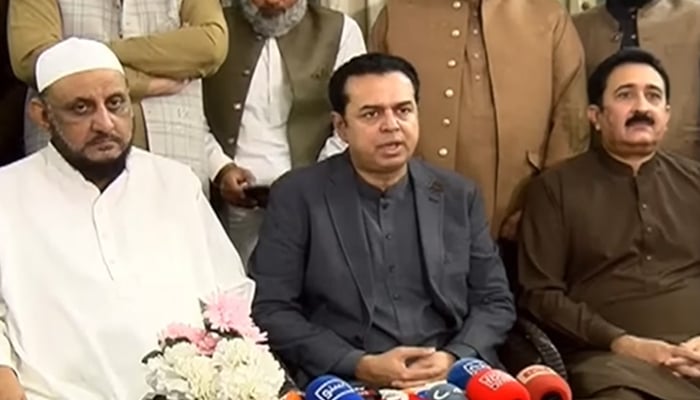
- Minister insists that judges are not a political party at all.
- He warns that Pakistan cannot afford instability or chaos now.
- Defends the authority of parliament to amend the Constitution.
Responding to criticism by Supreme Court judges against the constitutional amendments, Minister of State for Home Affairs Talal Chaudhry on Sunday defended the federal government’s move, saying that making changes to the Constitution is the exclusive right of parliament.
His statement came after two high court jurists, Mansoor Ali Shah and Athar Minallah, tendered their resignations following the promulgation of the 27th Constitutional Amendment earlier this week.
Not just the top court, a judge of the Lahore High Court (LHC), Shams Mehmood Mirza, also resigned a day ago, saying he was “unwilling, on principle and in good conscience, to continue as a judge” after the 27th Amendment.
The adjustments refined the structure of the newly created Federal Constitutional Court (FCC), clarified the titles and classification of the country’s top judges, and approved changes in military command.
On Friday, President Asif Ali Zardari approved the resignations of Shah and Minallah.
“Amending the Constitution is the exclusive right of Parliament, and it will do so whenever it wants,” he said while speaking to reporters in Faisalabad today.
He stressed that the judges “are not a political party” and only take an oath to respect the Constitution.
Chaudhry, criticizing sections of the judiciary, said the Constitution will reflect the parliament and people of Pakistan, not the judges. He added that the legislative branch “should be seen as a Parliament,” arguing that certain actors have “reduced it to a municipal corporation.”
He also said that judges’ salaries and “every single decision” ultimately falls under the authority of Parliament.
“These resignations [of judges] They are politicians. “They were still partial,” the minister said.
The ruling Pakistan Muslim League-Nawaz leader said the country cannot afford any kind of chaos or instability at this stage.
“Sometimes they dismissed prime ministers suo motu, and at other times they paralyzed elected governments,” he said.
Chaudhry said it was not the role of the judiciary to “expel whoever it wants and install whoever it prefers.”
It is worth mentioning here that SC jurists had criticized the 27th Amendment, describing it as a “serious attack on the Constitution of Pakistan”.
Shah, in his 13-page resignation letter, called the recent constitutional change an assault on the Constitution that dismantles the Supreme Court, compromises judicial independence and weakens the country’s constitutional democracy.
Warning that judicial independence faces “the beginning of the end,” he said nations lose their moral compass when justice is limited.
Justice Minallah, in his resignation letter, rejected the 27th Amendment, saying that the Constitution he promised to defend “no longer exists” and now survives only as a shadow without its spirit.
He wrote that he had warned the chief justice before the amendment’s passage, but that his concerns were realized amid “silence and inaction.” To continue in office, he said, would betray his oath and dishonor the memory of the Constitution.
However, the federal government described the judges’ resignations as “political speeches” and the latter’s accusations as “unconstitutional.”



